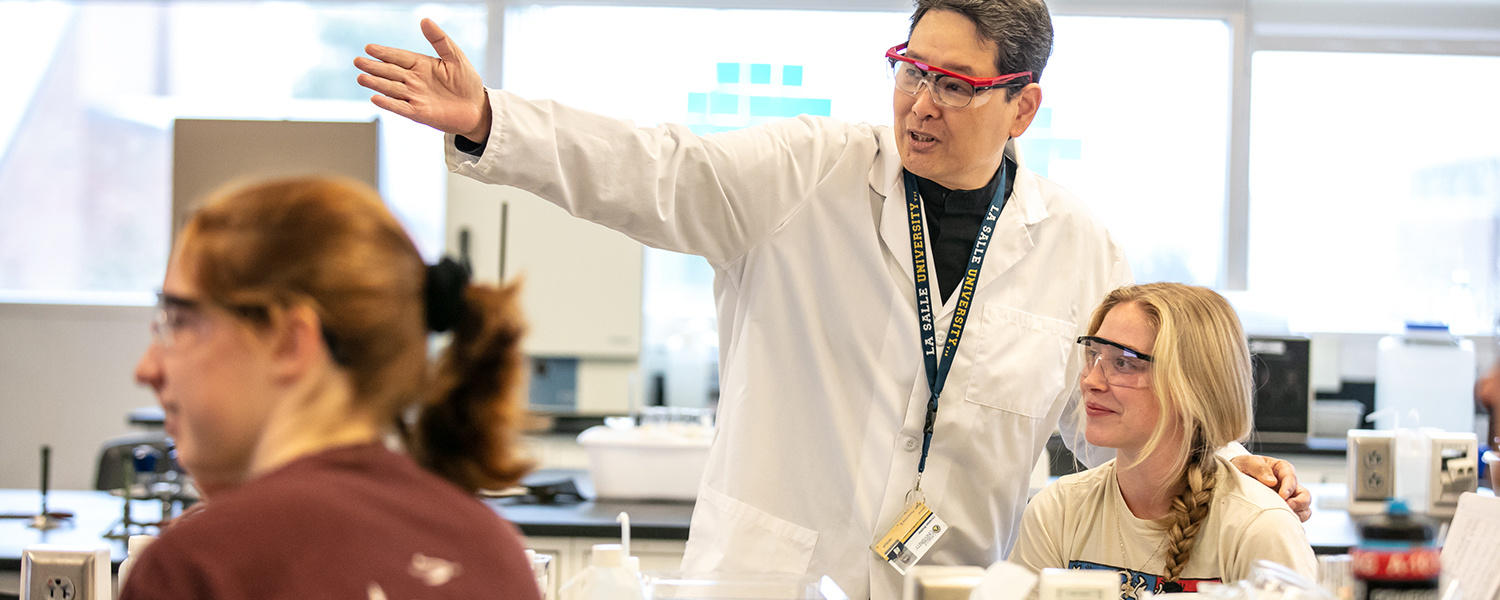La Salle University

What you’ll learn
La Salle’s Biology program fosters a foundational knowledge in the life sciences in students, encouraging them to apply this understanding in laboratory research projects that allow students to develop critical thinking skills and scientific reasoning. This training prepares students to pursue a broad range of opportunities related to the life sciences including medical or gradual school and careers in health professions, scientific/clinical technology, or science education.
Why Study Biology at La Salle?
La Salle University’s Biology program is ranked #30 out of 803 programs at U.S. colleges and universities in the “Best for the Money” category, placing it in the Top 5%. —College Factual
We reimagined undergraduate life science education employing an evidence-based approach. Course-based Undergraduate Research Experiences (CURE) are interwoven throughout our curricula, providing students with the opportunity to engage in authentic, discovery-based scientific research, and challenge them to apply foundational knowledge to address research questions. This CURE-based curriculum has been demonstrated to improve student learning and graduation rates compared to traditional teaching models in many studies of STEM learning and are a great preparation for all biology-related careers.
Highlighted Courses
Small World Initiative (SWI)
The Biology department partners with the Small World Initiative (SWI), a research consortium developed at Yale University to provide freshmen Biology majors with an authentic research opportunity that addresses a pressing, global health challenge – the rise of antibiotic resistant pathogens. Through a series of student-driven experiments, students collect soil samples, isolate diverse bacteria, test for antibiotic production against critically relevant micro-organisms, and characterize those that exhibit antibiotic activity. SWI’s approach provides a laboratory platform to crowdsource antibiotic discovery and advances promising candidates into the drug development pipeline.
Phage Hunting
The Biology department partners with SEA-PHAGES to provide an undergraduate research experience funded by the Howard Hughes Medical Institute. Phages are viruses that infect and kill bacteria and are a powerful tool for learning about microbiology. They have also been used as a therapy against antibiotic resistant bacteria. Over the course of two semesters, students isolate, characterize, and identify phages found in soil. Students then use bioinformatics tools to find genes hidden within the DNA of these viruses. Viruses that students discover are housed in a national repository, and genomes that are annotated are published on a national database, with students listed as authors. The SEA-PHAGES program gives students the opportunity to do real research that might one day provide an additional tool in managing infectious disease.
Life Science Innovation
Created in partnership with the Wistar Institute, Life Science Innovation provides students with hands-on science/technology commercialization projects. Cross-listed by the Biology, ISBT and Management & Leaderships programs, interdisciplinary teams of students select technologies from a curated patent portfolio of Wistar inventions. Teams interact with inventor scientists at Wistar to familiarize themselves with the underlying science/technology, as well as with external partners such as venture capitalists, intellectual property lawyers, and biotechnology entrepreneurs—to identify unmet needs the science/technology addresses, and define key commercialization issues such as IP, market opportunity, competition, regulatory pathways, and potential customers. At the end of the semester, teams compete in a “shark-tank” competition and pitch to a panel of life science investors.
Meet the Faculty
The faculty of La Salle’s Biology Department serve qualified students interested in pursuing further education and careers in the life sciences, health professions, and science education. In addition, we provide non-science majors a variety of foundation level courses that explore biological issues of interest and concern to the general public.
Career Opportunities
According to the Bureau of Labor Statistics, the median annual wage for someone with a Biology degree is $65,000.
Alpha Epsilon Delta
National Health Preprofessional Honor Society dedicated to the encouragement and recognition of excellence in preprofessional health scholarship
La Salle gives its students countless opportunities to get involved, whether that be through research in the core lab or volunteering with different organizations around the Philadelphia area, and it’s how I met some of my best friends here.